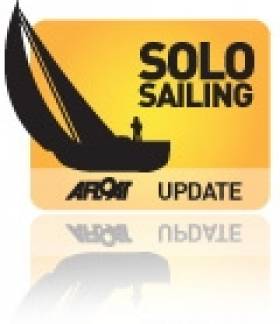Displaying items by tag: Garry Golding
Two Revamped 60s Afloat Ahead of Velux Race
They have spent the last few months hidden away in boatsheds undergoing major transformations – but now two Eco 60 yachts have emerged from their makeovers and have been lifted into the water for the VELUX 5 OCEANS.
Both Brad Van Liew's Eco 60 Le Pingouin and Garry Golding's Oz have made it to the water after months of refitting. Le Pingouin, formerly Pro Form, has been given a stunning golden paint job and proudly sports a penguin logo on its hull. Australian sailor Golding's yacht meanwhile has been transformed from Dee Caffari's yellow and blue Aviva 1 into Oz, with white hull and patriotic gold and green topsides.
Le Pingouin and Oz are the first boats to emerge from the shed as the VELUX 5 OCEANS racers make their final preparations for the 30,000-mile singlehanded race around the world, which starts in La Rochelle, France, on October 17.
"We've redesigned the deck and cabin to suit my sailing style, repainted her with some
awesome and eye-catching graphics, and brought every facet, no matter how minute, up to the highest standards possible for an ocean-going racer," said Van Liew. "This will not only be my home for nine months, but she's my survival pod, my life raft, and will need to keep me safe for 30,000 miles of wild ocean sailing. Our equipment is the best, our shore team is the best, and we're ready."
Golding added: "Getting the boat back in the water is a real milestone for us. It's been really hard work but she looks amazing. We are really proud of Oz and are very grateful to everyone who has helped get her this far."
Golding will step the mast on Oz at the end of the week. Both Van Liew and Golding will then make last minute tweaks to their yachts before setting sail on their qualification passages later this month.
The VELUX 5 OCEANS, run by Clipper Ventures PLC, is the longest running solo round the world race, and has 28 years of rich heritage as the BOC Challenge and then the Around Alone. This edition features five ocean sprints over nine months. After setting off on October 17 from La Rochelle to Cape Town, the race will then take in Wellington in New Zealand, Salvador in Brazil and Charleston in the US before returning back across the Atlantic to France.





























































